Elk meat is a tasty and nutritious type of red meat that can be used as a substitute for beef in almost any beef recipe. It is not among the most popular types of meats consumed in North America, however, if you want to introduce more variety into your diet while remaining health conscious, elk meat is a great choice.
Elk meat, like most types of meat, can be stored in the refrigerator for up to 5 days. If you want to preserve elk meat for a longer duration of time, you should store it in the freezer.
The lower temperature of the freezer stops the oxidation process, which causes food to spoil. When kept in the freezer, elk meat retains its flavor, nutritional value, and appearance for up to 12 months. Elk meat that is frozen for longer than a year will be safe to eat, but it may start to look less visually appealing.
What is Elk Meat?
As you might have guessed, elk meat is the meat of an elk. An elk is a member of the deer family, which is bigger than your common deer but smaller than a moose. Unlike venison, which is the culinary name for deer meat, elk meat is known in the culinary world by the same name as the animal it comes from. Elk meat is a type of red meat which is most commonly compared to beef and venison, though it has a distinct taste all of its own.
Is Elk Meat Good for You?
Red meat has had a rough time in the media for a long time now, and it has gained a reputation for something we need to be cutting back on. However, elk meat is among the healthiest types of red meat, so it isn’t entirely fair to paint elk meat with the same brush as other types of red meat. Here we look at the various nutritional factors of elk meat to get a better idea of how it can impact our health compared with other types of meat, game, and poultry.
Low in fat
Elk meat is lower in fat than all other types of red meat. While around a third of the energy from beef comes from fat, only a quarter of the energy from elk meat is from fat. Lamb is one of the highest fat types of meat you can eat, with almost half of the energy content from lamb meat coming from fat.
If you are trying to reduce your fat intake while still enjoying a diet of red meat, then elk is a good choice. The lower fat content does mean you need to be careful not to overcook it; otherwise, it can take on a tough texture.
High in protein
Elk meat, like all red meats, has a high protein content. This means it is a good food to incorporate into a healthy diet if you are trying to build muscle. Protein is also essential for the development of bones, tissue, hair, and skin. While all red meat is a good source of protein, elk meat contains more protein than beef, pork, and chicken, which are the three most commonly eaten meats in the US.
Low in calories
Elk is low in calories compared with other red meats. While a 3-ounce beef steak will contain approximately 220 calories, the same-size elk steak will contain around 180 calories.
Low in cholesterol
If you are trying to maintain a diet low in cholesterol, then you might be avoiding red meats. However, elk has a lower cholesterol content than all other red meats and even some white meats.
Typically a 100-gram serving of beef will have 85 mg of cholesterol, and a 100-gram serving of chicken breast will have 83 mg of cholesterol. Turkey meat is much lower, with a 100-gram portion containing 68 mg of cholesterol. Elk meat, by comparison, is considerably more healthy, with just 56 mg of cholesterol per 100 gram serving.
Vitamins and minerals
Elk meat contains a wide range of vitamins and nutrients that are essential for the healthy development of human bodies. It has a high proportion of amino acids, which helps with the development of bone, tissue, and muscle. A 3-ounce serving of elk meat will supply an adult with many of the recommended daily vitamins.
One portion of elk will contain 100% of the recommended daily amount of vitamin B12, along with 40% of riboflavin, 30% niacin, and 15% of iron requirements. Other vitamins and minerals in elk meat include zinc, B6, thiamine, and phosphorus.
How to Store Elk Meat

Elk meat should not be left at room temperature for longer than 4 to 6 hours because it will spoil. Unless you plan to prepare and eat your elk meat right away, you will need to store it in either a refrigerator or a freezer.
Refrigerator storage
Like most meats, elk meat can be stored in the refrigerator if you intend to consume it within a few days. Typically you can keep elk meat in the refrigerator for up to 5 days, but this depends on how fresh the meat was when you received it. If the meat is very fresh, it could last as long as a week or more in the refrigerator, or it may need to be eaten within 1 or 2 days if it was bought from the grocery store and is not very fresh.
Check the smell and look of elk meat from the refrigerator before you eat it. The meat should not smell sour or rancid, and it should have a deep and dark color. If it doesn’t smell or look as you would expect, it is best not to eat it.
Freezer storage
Freezing elk meat is the best way to preserve it. The cold temperature halts the spoiling process so that when you come to defrost the meat, it will be just as fresh as the day you bought it home. You can keep fresh, raw elk meat in the freezer for up to 12 months, and it will remain in excellent condition.
Elk meat is safe to eat after being frozen for more than 12 months, but you may find that the color, texture, or flavor of the meat degrades. If your elk meat has already been cooked, then you can still freeze it, but for a shorter period of time. Pre-cooked elk meat can be kept in the freezer for a maximum of 4 months. As with any meat stored in the refrigerator or freezer, look out for signs of bad odor if you are unsure whether the meat is suitable to be eaten.
To extend the lifespan of your elk meat in the freezer, preparation is key. Tightly wrap elk meat in aluminum foil or plastic wrap in an effort to minimize the amount of air surrounding the meat.
Now put the meat in a ziplock bag or similar, pushing out as much air as possible. Label and date the package, and put it directly in the freezer. When you want to defrost the elk meat, put it into the refrigerator for 24 hours and then treat it as fresh elk.






